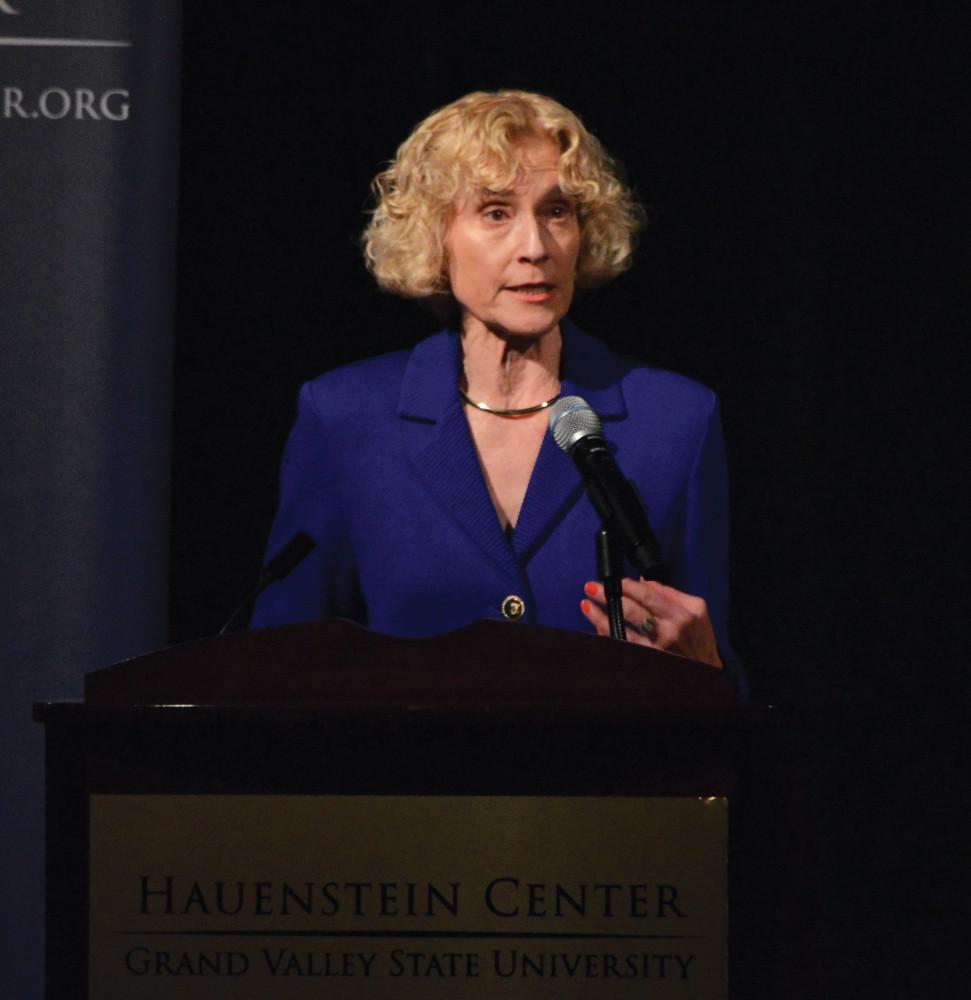Law professor discusses role of anger in politics

GVL/ Hannah Zajac- Martha Nussbaum speaks about anger in a political world in the L.V. Eberhard Center in downtown Grand Rapids, on Tuesday, April 4, 2017.
Apr 6, 2017
World-renowned philosopher Martha C. Nussbaum, the Ernst Freund distinguished service professor of law and ethics at the University of Chicago, spoke at Grand Valley State University’s L.V. Eberhard Center Tuesday, April 4. In her lecture, “Anger and Revolutionary Justice,” she discussed the role and ineffectiveness of anger in social and political settings.
Scott St. Louis, the program manager for the Common Ground Initiative (CGI) at the Hauenstein Center for Presidential Studies, introduced Nussbaum by saying the overarching goal of the CGI is to shed light on difficult, relevant topics to prepare next-generation leaders to be as effective as possible.
“Our Common Ground Initiative program brings leaders from all across the United States right here to Grand Rapids for serious discussion about the political and intellectual and cultural challenges that Americans face,” St. Louis said. “Our goal isn’t to turn Democrats into Republicans or Republicans into Democrats. Our goal is to prepare a new generation of leaders to learn broadly, articulate their values and to thrive amidst a variety of ideas and cultures that exist.”
Kicking off her lecture, Nussbaum pointed out that anger is a popular human emotion and that justice and anger don’t necessarily have to correlate.
“For anger, with all its ugliness, is a popular emotion,” Nussbaum said. “Many people think it’s impossible to care about justice without anger and injustice and that anger should therefore be encouraged as part of the transformative process.”
Pointing out the first problem with anger, Nussbaum said retribution, which stems from anger, does not accomplish anything. She said nothing is rectified through reciprocal actions fueled by anger.
“The central issue with anger is this: The payback idea does not make sense,” she said. “Ideas of cosmic balance are extremely wide-spread and archaic, and almost all of us have them at some level when wrong is done. We somehow think the universe will be off-kilter, that there’s a proportional rectification on the other side.”
Using Mohandas Gandhi, Martin Luther King Jr. and Nelson Mandela as role models, Nussbaum elaborated on the problem of reciprocation as a method for obtaining justice. Nussbaum said no matter what the wrongdoer did against someone, wishing harm against the culprit is not going to regain what has already been lost. She said although the desire for justice is human, it is flawed.
“It just doesn’t make sense in the world of human action,” she said. “Whatever the wrong is that was done—a murder, a rape—inflicting pain on the wrongdoer does not in and of itself restore the thing that was lost.”
Nussbaum said when someone experiences anger, they are typically choosing between two paths. The first one, as stated above, is reciprocation in the need for justice. The second has to do with the desire to downrank the wrongdoer. If relative status is a top priority for an individual, as narcissistic as that may seem, downranking is entirely effective in its consequences.
“If the problem is not the murder or the rape itself but the way it has affected my relative rank in the social hierarchy, then I really can achieve what I want by humiliating the wrongdoer by pushing that person relatively lower,” Nussbaum said. “I automatically do push myself up relatively higher.”
Still, Nussbaum pointed out that anger, used correctly, does have its benefits. She said anger can be used as a wake-up call, as motivation and as a useful deterrent. She reminded the audience to keep this in mind as current political events unfold. She said anger is prominent in everyone’s lives but when used incorrectly, it impedes progress that would otherwise be made.
“Progress is impeded by the other party’s defensiveness and anxiety,” Nussbaum said. “Anger consequently does nothing to move matters forward. It just increases the other party’s anxiety and self-defensiveness. A gentle approach, by contrast, can gradually weaken defenses until the whole idea of self-defense is given up.”






















